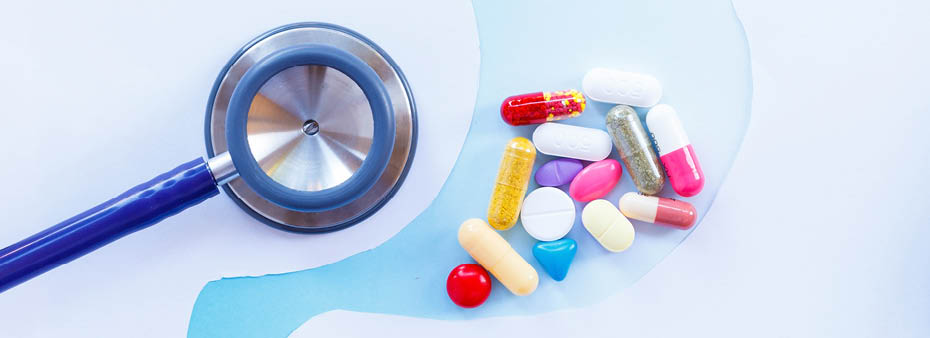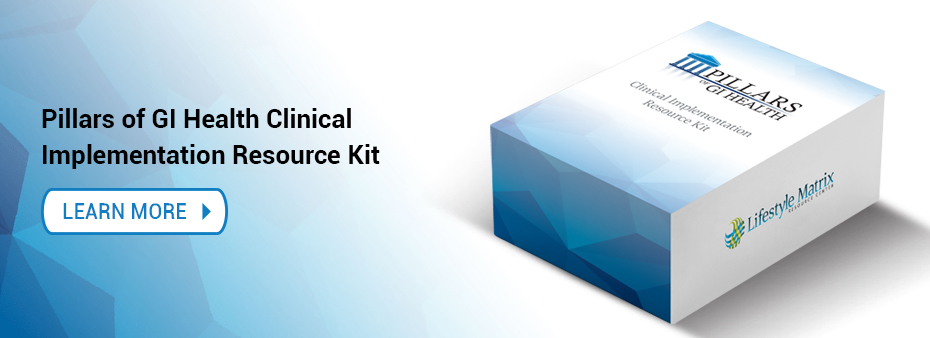Proton pump inhibitors (PPIs) are among the most widely prescribed drugs worldwide, accounting for a profit in the billions for the pharmaceutical industry. They are the leading Western treatment for GERD, dyspepsia, and peptic ulcer disease. But the problem is that PPIs are not used judiciously for the short-term, such as healing a gastric ulcer; instead, patients are prescribed PPIs, then kept on them indefinitely without regard to the long-term potential harm of these medications. Patients’ doctors indiscriminately refill their PPI prescription year-after-year.
- The side effects from chronic PPI exposure include:1
- Hypergastrinemia
- Enterochromaffin-like cell hyperplasia
- Parietal cell hyperplasia
- Irritable bowel syndrome (usually with diarrhea)
- Impaired nutrient absorption (decreased B12, calcium, magnesium, and iron absorption)
- Increased risk of osteoporosis and bone fracture
- Yeast overgrowth (like Candida)
- Increased risk for small intestine bacterial overgrowth (SIBO)
- Increased risk of Clostridium difficile infection
- Suppresses immunity, increasing the risk for a community-acquired or hospital-acquired pneumonia
The Challenge
Weaning a patient off a PPI can be one of the most challenging endeavors in medicine, aside from opiate withdrawal. The process tests the patience of both the patient and the practitioner. These medications physiologically “addictive” to the mucosa—the resulting hypergastrinemia causes enterochromaffin-like (ECL) cell hyperplasia, which leads to severe rebound acidity when they are withdrawn. This hypergastrinemia may even increase the risk for ECL cell-derived neuroendocrine carcinomas. They are also psychologically addictive to the patient who inevitably clings to them like a security blanket against these very uncomfortable symptoms. The first challenge is to explain to the patient how the physiology of reflux is a sign of loss of function (too little acid production), rather than excess function (too much acid production, which is the argument used to justify prescription of these anti-acid medications). Lack of stomach acid can lead to an inability to break down protein into its component amino acids, a severe dysbiosis, pancreatic dysfunction, and protein malabsorption. The resulting amino acid deficiency may lead to an insufficiency in the production of neurotransmitters relying on these amino acid precursors as the raw materials used by the body to manufacture them. Because of these imbalances, you may even see severe anxiety and depressive feelings in the patient.

The Protocol
The longer a patient has been treated with PPIs, the harder it is to get them off the medication. The speed with which PPIs can be weaned is dependent on the patient’s ability to adhere to an anti-reflux diet protocol, reduce stress, practice mindfulness, chew food thoroughly, finish dinner more than three hours prior to bedtime, and follow a gut-healing supplement protocol that addresses the 5Rs of gut dysfunction—Remove, Replace, Re-inoculate, Repair, and Rebalance. I use a gradual approach, slowly reducing the PPI dose, while working on gut-rebuilding protocols. This may include alternating the PPI dose with a higher and lower dose on alternating days, as well as every-other-day dosing with an H2-blocker to help them move forward with the wean, while allowing time for the hypergastrinemia to resolve itself and the ECL cell hyperplasia to reverse. Using supplements, like DGL and aloe to soothe the digestive lining, is an important consideration. You must also address the problem of gastric HCl hyposecretion that will revert to baseline once the PPI is weaned by incorporating digestive enzymes during the weaning process and betaine HCl to assist with protein digestion.
The truth is, restoring normal stomach function after extended PPI treatment is a rocky affair marked by successes and setbacks. Understanding this, the practitioner is better prepared to stay calm as he or she serves as the lighthouse helping the patient navigate the treatment regimen. The road to recovery is usually not paved with the idealism of model case studies, but ultimately with perseverance and steadfastness in sticking to a plan. It requires commitment from patient and practitioner, and is best achieved slowly and with lots of patience.
VINCENT PEDRE, MD

Dr. Vincent M. Pedre is the medical director of Pedre Integrative Health and founder of Dr. Pedre Wellness, medical advisor to two health-tech start-ups (MBODY360 and Fullscript), and a functional medicine-certified practitioner in private practice in New York City since 2004. He is a clinical instructor at the Mount Sinai School of Medicine, and is certified in yoga and medical acupuncture. On faculty at The Institute for Functional Medicine, Dr. Pedre taught the first AFMCP in Lima, Peru in November 2017. Most recently, he joined the Lifestyle Matrix Resource Center as a Clinical Expert serving the Pillars of GI Health Program. He believes the gut is the gateway to excellent health. For this reason, he wrote the book, Happy Gut—The Cleansing Program To Help You Lose Weight, Gain Energy and Eliminate Pain, which helps people resolve digestive and gut-related health issues.
References
- Long-term safety of proton pump inhibitors: risks of gastric neoplasia and infections. Waldum HL, Brenna E, Sandvik AK Expert Opin Drug Saf. 2002 May; 1(1):29-38.
- Gastric neuroendocrine carcinoma after long-term use of proton pump inhibitor. Jianu CS, Lange OJ, Viset T, Qvigstad G, Martinsen TC, Fougner R, Kleveland PM, Fossmark R, Hauso Ø, Waldum HL Scand J Gastroenterol. 2012 Jan; 47(1):64-7.




